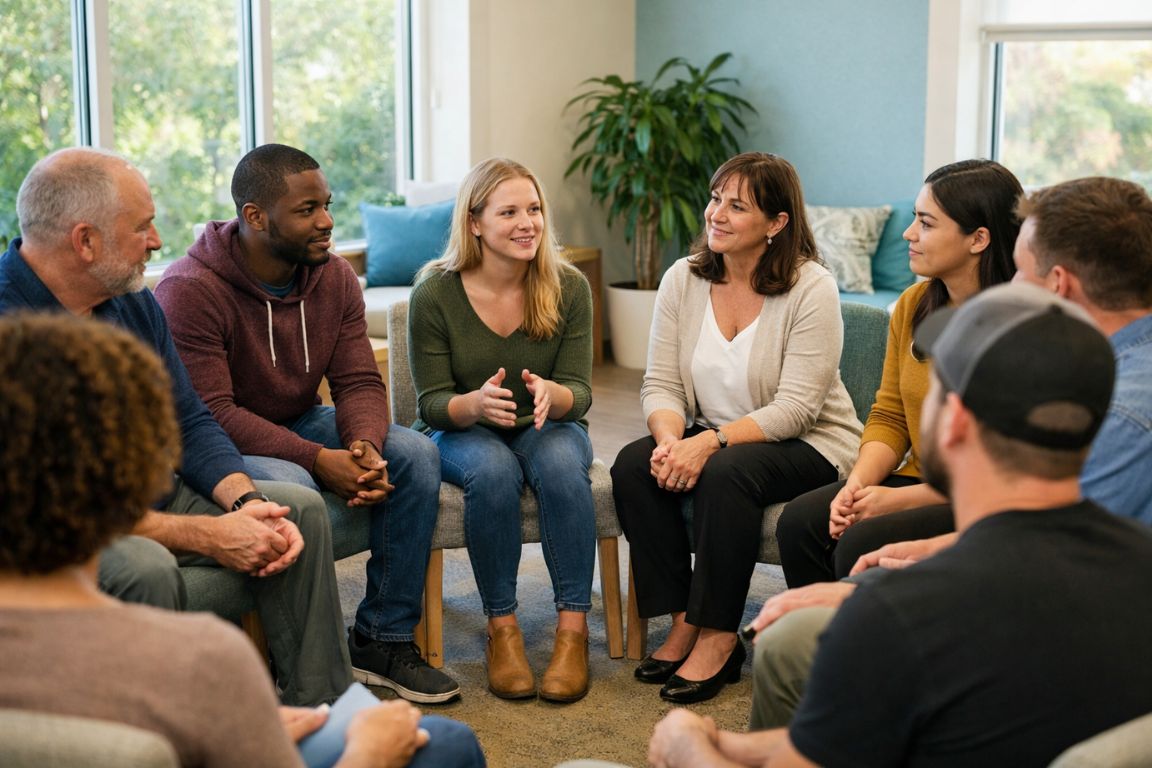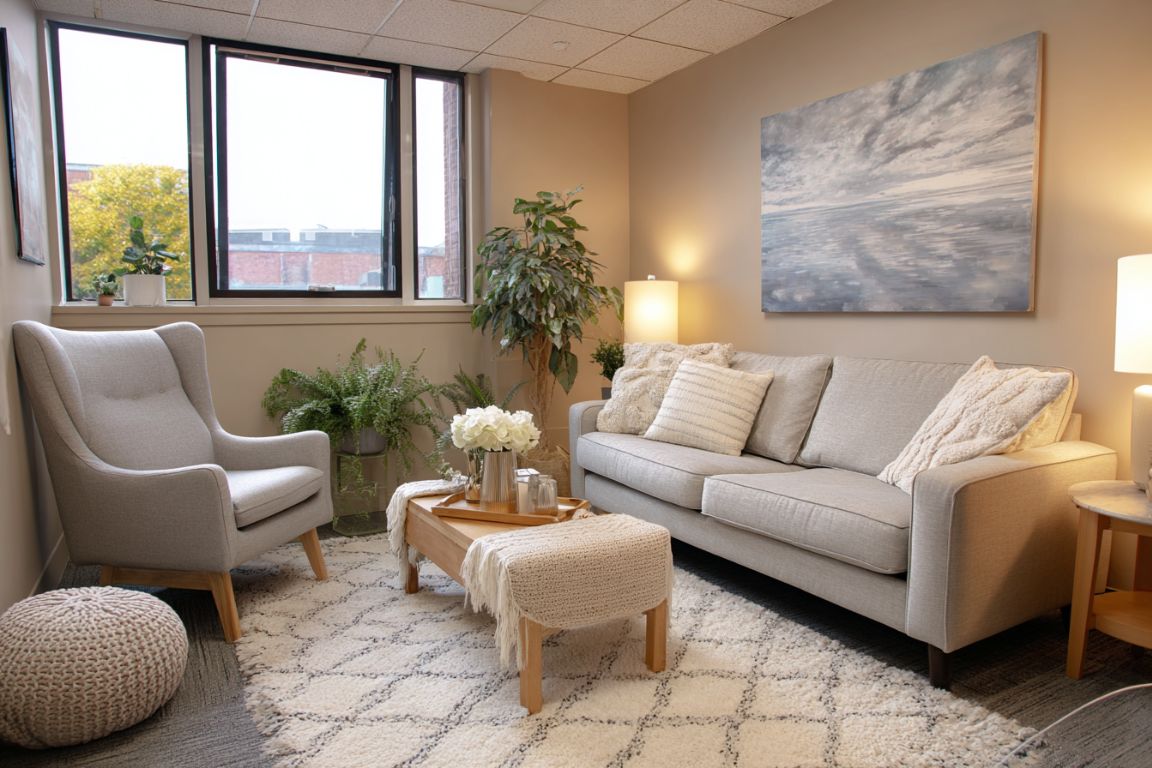Couples rehab helps partners tackle addiction together through combined therapy and support. These programs focus on both individual recovery and relationship health. Read on to learn how couples rehab works, its benefits, and how it strengthens your bond.
Key Takeaways
- Couples rehab programs focus on addressing individual addictions while strengthening relationship dynamics through mutual support and tailored treatment plans.
- Effective therapy methods, including joint sessions and techniques like Cognitive Behavioral Therapy, help couples navigate recovery together by improving communication and coping skills.
- Challenges such as differing treatment needs and potential relapse risks underscore the importance of a supportive environment and ongoing communication in maintaining sobriety post-rehab.
Understanding Couples Rehab Programs

Couples rehab programs are designed with a dual purpose: to address individual addictions while simultaneously strengthening the bond between partners. The primary goal is to provide an environment where mutual support becomes the cornerstone of recovery, emphasizing relationship health and individualized treatment plans. These programs recognize that addiction doesn’t just affect the individual; it impacts the relationship dynamics and overall family environment.
The effectiveness of couples rehab is notable, often leading to significant reductions in substance use when partners participate together. This is achieved through a combination of clinical therapy, proper medication management, and comprehensive aftercare plans. Therapy in couples rehab addresses both individual and shared issues, such as codependency and communication difficulties, ensuring that couples can tackle these challenges together.
Counseling and education play crucial roles in these programs, helping couples improve their relationship and coping skills to handle difficulties together. Whether at the beginning stages of addiction or dealing with long-term substance abuse, couples rehab programs are tailored to meet the unique needs of both partners. Combining addiction treatment with relationship counseling creates a supportive environment for couples to develop better coping mechanisms and strengthen their bonds.
How Couples Rehab Works
Couples rehab programs typically include a mix of joint therapy sessions, individual counseling, and group therapy. This approach allows each partner to focus on their personal issues while participating in joint sessions that address their relationship dynamics. The process usually starts with separate sessions to tackle individual challenges before transitioning to joint therapy, where couples can work on shared goals and issues.
In addition to individual and couples therapy, group support sessions play a vital role in enhancing the recovery process. These sessions not only help in dealing with underlying reasons for substance abuse but also teach couples essential skills such as communication, conflict resolution, and emotional control. Substance abuse treatment is also an important aspect of the recovery journey.
Techniques like the Gottman Method are often used to improve communication and relationship satisfaction, supporting the overall recovery journey.
Benefits of Couples Rehab
The benefits of couples rehab are manifold. These programs provide mutual support and motivation, which are crucial in overcoming addiction together. Improved communication skills help resolve misunderstandings and foster a better emotional environment for recovery.
Couples can establish shared recovery goals, aligning their efforts and commitment towards achieving sobriety, thus enhancing their relationship dynamics and providing opportunities for shared experiences that strengthen their partnership.
Challenges in Couples Rehab
Despite its benefits, couples rehab comes with its own set of challenges. One partner might require a specific type of treatment center that isn’t suitable for the other, leading to conflicts. Differences in individual treatment needs can also cause friction, as each partner may be at a different stage in their readiness for rehab. If only one partner goes to rehab, it can make it harder for the other partner to avoid relapse, further complicating the recovery process.
Certain circumstances, such as violent behavior or severe medical and psychological issues, might necessitate separate living arrangements for couples in rehab. These challenges require careful navigation and a supportive rehab environment to ensure both partners can progress on their recovery journey without hindering each other.
Types of Addiction Treatment in Couples Rehab

\Couples rehab programs encompass a variety of treatments, including detoxification, inpatient rehab, outpatient rehab, and aftercare. These programs are designed to address both alcohol and drug addictions, providing comprehensive support for couples struggling with substance abuse and alcohol rehab. Facilities specializing in couples drug rehab and drug and alcohol rehab offer tailored treatment programs that cater to the unique needs of each couple, ensuring a holistic approach to drug rehab recovery.
Inpatient and outpatient options are available to accommodate different recovery needs. Inpatient rehab provides a structured environment with 24/7 medical support, while outpatient rehab allows couples to receive treatment while maintaining their personal and work responsibilities. Both options include various therapies such as behavioral therapy and Behavioral Couples Therapy (BCT), which are integral to the recovery process.
Special therapies are often tailored to meet the specific needs of couples, enhancing their recovery experience. Partial Hospitalization Programs (PHPs) offer a blend of behavioral therapy, individual therapy, group therapy, and counseling, all tailored to couples. Medication-Assisted Treatment (MAT) is also an option, involving medications like methadone, buprenorphine, and naltrexone to reduce cravings and manage withdrawal symptoms effectively.
Overall, couples attending rehab together often experience better outcomes, such as higher abstinence rates, greater relationship satisfaction, and improved family functioning.
Inpatient Rehab for Couples
Inpatient rehab for couples typically requires participants to reside at the rehab center, offering a structured environment that supports recovery. This immersive setting provides 24/7 medical support and continuous therapeutic interventions, ensuring couples have access to help whenever they need it.
Establishing specific, measurable, achievable, relevant, and time-bound (SMART) goals is essential in this setting, as it creates a clear roadmap for recovery. Together, the structure of inpatient rehab and the establishment of these therapeutic goals create a solid foundation for couples facing addiction.
Outpatient Rehab for Couples
Outpatient rehabilitation allows couples to receive treatment while living at home, accommodating personal and work responsibilities. This approach provides a structure that helps couples integrate recovery into their daily lives, ensuring they can maintain their commitments while working towards sobriety.
Detoxification Process
The detox process is an essential first step in addiction treatment, aiming to reduce withdrawal symptoms after quitting substance use. Withdrawal symptoms typically occur six hours after the last use, and the detox process usually takes 7 to 10 days.
In couples rehab, detox is medically supervised to ensure safety and effectiveness, with a qualified doctor evaluating symptom intensity and performing necessary procedures. This medical detox procedure is crucial for managing withdrawal symptoms and setting the stage for further recovery steps.
Therapy Approaches in Couples Rehab

Therapy in couples rehab focuses on developing healthy communication and working through past relationship issues together. A unified treatment approach in couples rehab helps partners learn about each other’s triggers and develop joint relapse prevention strategies. This approach often combines individual and joint therapy sessions to address both psychological aspects of substance abuse and interpersonal dynamics.
Psychotherapy helps identify the underlying reasons for alcohol addiction and drug addiction and teaches emotional control and stress management to assist with anger management. Methods like the Gottman Method are utilized to help couples reconnect in a meaningful way, fostering a deeper understanding and stronger bond.
Cognitive Behavioral Therapy (CBT)
Cognitive Behavioral Therapy (CBT) aims to help couples create a new standard of relationship behavior that prioritizes sobriety. Implementing CBT principles helps couples avoid relationship issues that trigger addiction and develop healthier interactions as a sober couple.
Behavioral Couples Therapy (BCT)
Behavioral Couples Therapy (BCT) is geared towards helping couples abstain from substance use by improving communication and overall positivity in the relationship. This approach is particularly beneficial when both partners actively participate in therapy, allowing them to tackle substance abuse and relationship dynamics concurrently.
Group Therapy Sessions
Group therapy is a significant component of couples rehab programs, offering a platform for shared support and experiences. In these sessions, couples connect with peers in similar situations, fostering a supportive environment where they can gain insights from different perspectives.
This camaraderie is essential in navigating the challenges of addiction recovery together.
Addressing Dual Diagnosis in Couples Rehab

Dual diagnosis, or the presence of both drug and alcohol addiction and mental health disorders, requires integrated treatment to enhance recovery outcomes. Couples rehab programs should incorporate mental health services to address underlying psychological issues that may contribute to substance use. This integration significantly improves long-term recovery outcomes by providing a comprehensive support structure.
Dual diagnosis treatment centers offer specialized care that simultaneously addresses mental health and substance use disorders. By tackling both issues concurrently, these centers ensure that couples receive the holistic treatment necessary for sustained recovery.
Integrated Treatment Plans
Integrated treatment plans in couples rehab address both addiction and mental health concerns concurrently. These plans involve collaboration between mental health and addiction specialists to create a cohesive strategy for recovery. Therapy targets mental health issues like anxiety, bipolar disorder, and depression, providing personalized care based on each couple’s specific situation.
Ongoing assessments are crucial in these plans to adapt strategies based on each couple’s evolving needs. This dynamic approach ensures that both partners receive the necessary support to address their unique challenges and progress in their recovery journey.
Importance of Mental Health Services Administration
The administration of mental health services is vital for long-term recovery in couples rehab. A team composed of addiction specialists, counselors, therapists, and medical staff provides comprehensive support to address both addiction and underlying mental health issues.
Skills such as holding each other accountable and maintaining sobriety are crucial components of this support, ensuring couples have the tools to sustain their recovery.
Preparing for Couples Rehab
Finding the right couples rehab program is crucial for successful recovery. Conducting an internet search or contacting local organizations can help identify suitable options.
Preparing for rehab involves several steps, including assessing readiness, packing essentials, and setting recovery goals.
Assessing Readiness for Rehab
Assessing both partners’ readiness for rehab is essential for a successful recovery journey. This involves evaluating their commitment to treatment and willingness to change, as well as engaging in open communication about their feelings and concerns.
Each partner should consider their individual readiness and personal motivation to fully engage in the rehab process.
Packing Essentials
Packing the right items for inpatient rehab is crucial for comfort and continuity of care. Couples should bring personal items, comfortable clothing, and any medications they need during their stay.
Examples of personal items include toiletries, books, and journals, which can help couples focus on their recovery during their time in rehab.
Setting Recovery Goals
Setting SMART goals can help individuals in recovery measure and achieve their sobriety objectives. These goals should be Specific, Measurable, Achievable, Relevant, and Time-bound, providing a clear roadmap for recovery. Awareness of emotional and physical triggers is also crucial for maintaining sobriety, as it helps individuals recognize and manage situations that may lead to relapse.
By setting and regularly reviewing these goals, couples can stay focused on their recovery journey and support each other in achieving long-term sobriety.
Life After Rehab: Maintaining Sobriety Together

Life after rehab presents its own set of challenges for couples, including managing relationship dynamics and avoiding relapse. Post-rehab, couples may encounter emotional injuries and reversed relationship habits, which can make maintaining sobriety difficult. If one partner relapses, it increases the likelihood of the other partner relapsing as well.
Engaging in wellness practices, such as regular exercise and mindfulness, supports physical and mental health in recovery. Building a sober social network is also essential, involving shifts from negative relationships to supportive ones. A structured daily routine incorporating regular activities and adequate rest helps maintain sobriety by providing stability and purpose.
Relapse Prevention Strategies
Developing a comprehensive relapse prevention plan is crucial for couples in recovery. These plans teach strategies to handle triggers and stress together, helping prevent relapse. Ongoing therapy sessions, support group participation, and regular check-ins can be integral components of a successful relapse prevention plan.
Continuing Therapy
Ongoing therapy is essential for couples to understand the challenges that may arise during recovery and develop coping strategies to navigate them. Therapists provide tailored guidance to reinforce couples’ commitment to sobriety and to each other. Support groups offer a community of peers who share similar experiences, fostering a sense of understanding and belonging.
Through shared experiences in support groups, couples can find motivation and an accountability system to remain sober. Regular check-ins to discuss feelings and challenges related to recovery help maintain open communication and mutual support.
Building a Supportive Environment
A supportive environment is essential in couples rehab. This is particularly important when dealing with dual addiction. Providing tranquility and security in the living environment helps couples focus on their recovery.
Privacy is prioritized to ensure couples can heal without external pressures, creating a home environment that promotes sobriety and healthy living.
Summary
Couples rehab offers a unique and effective approach to addiction treatment, emphasizing mutual support and relationship health. By combining individual and joint therapy, these programs provide comprehensive care that addresses both personal and shared challenges. The various treatment options, from inpatient and outpatient rehab to detoxification, cater to the diverse needs of couples in recovery.
Maintaining sobriety after rehab requires ongoing effort, including relapse prevention strategies, continued therapy, and building a supportive environment. By working together and utilizing the tools and support systems provided by couples rehab, partners can achieve long-term sobriety and strengthen their relationship. Remember, the journey to recovery is a shared path, and with mutual support and commitment, couples can overcome addiction together.
Frequently Asked Questions
What makes couples rehab different from individual rehab?
Couples rehab is distinctive because it addresses both partners’ addictions simultaneously, fostering mutual support and enhancing relationship dynamics. This combined focus can lead to improved recovery outcomes for both individuals and their relationship.
How does couples rehab improve communication?
Couples rehab enhances communication by providing joint therapy sessions and techniques that improve interpersonal skills, leading to more effective dialogue between partners. This fosters a healthier emotional environment conducive to recovery and relationship strengthening.
What are some challenges specific to couples rehab?
Couples rehab faces challenges such as differing treatment needs and varying readiness levels, which can lead to conflicts. Addressing external issues like violent behavior or severe medical concerns is vital for both partners to successfully progress in their recovery.
Can couples rehab address mental health issues?
Yes, couples rehab can effectively address mental health issues by providing integrated treatment plans that tackle both addiction and any underlying psychological conditions simultaneously, thus enhancing long-term recovery outcomes.
What should couples bring to inpatient rehab?
Couples should bring personal items such as toiletries, comfortable clothing, medications, and comfort items to enhance their recovery experience. Being well-prepared with these essentials allows them to focus on healing together.

Mitchell Grant Cohen
Dr. Mitchell G. Cohen is a board-certified Internal Medicine specialist with over 34 years of experience in patient-centered healthcare. A graduate of Hahnemann University School of Medicine, Dr. Cohen completed his internship at the University Health Center of Pittsburgh, where he gained invaluable hands-on experience. He is also a certified addiction specialist, holding membership with the American Society of Addiction Medicine (ASAM).
Currently based in Nashua, NH, Dr. Cohen is affiliated with Saint Joseph Hospital, where he provides comprehensive care focusing on both internal medicine and addiction treatment. His expertise includes prevention, diagnosis, and management of adult diseases, as well as specialized care for individuals facing substance use disorders.
Dr. Cohen is committed to fostering open communication, ensuring his patients are fully informed and empowered to make confident decisions about their health and treatment options.





